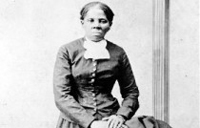The next talk in the Tubman Speaker Series will focus on the social, cultural and intellectual history of Yoruba speakers who landed in 19th-century Sierra Leone as a result of the British Navy’s efforts to suppress the transatlantic slave trade.
The guest speaker is Richard Anderson, a fifth-year PhD candidate in Africa history at Yale University. He will discuss “The Making of the Aku: Ethnicity in Sierra Leone’s Yoruba Diaspora”, on Thursday, Nov. 14, from 3:30 to  5pm at 305 York Lanes, Keele campus. It is presented by The Harriet Tubman Institute.
5pm at 305 York Lanes, Keele campus. It is presented by The Harriet Tubman Institute.
Richard Anderson
From the 1820s onward, Yoruba in Sierra Leone were known as the “Aku” and were identified by several colonial governors and subsequent historians as the “largest and most cohesive group” in the colony. Yet in their homelands, the Aku had known themselves by much more localized identities and did not possess a common name.
Anderson’s talk will trace the origins and various meanings of “Aku” in Sierra Leone and beyond, the role of language in shaping identity, and the interaction between Islam, Christianity, and Orisha worship in defining the Aku. He will consider the shifting relationship between diaspora and homeland, as Aku merchants and missionaries returned to coastal towns near their ancestral homes.
Anderson research focuses on pre-colonial and colonial West Africa. His dissertation, titled “Recaptives: Community and Identity in Sierra Leone, 1808-1863”, explores the social and cultural history of freed slaves settled in and around Sierra Leone’s capital of Freetown. Prior to Yale, he completed his BA in history and political science at the University of Waterloo, and a master’s in African Studies at the University of Oxford.
For more talks, visit the Tubman Speaker Series for 2013/2014 and the Working Paper Series web pages.


